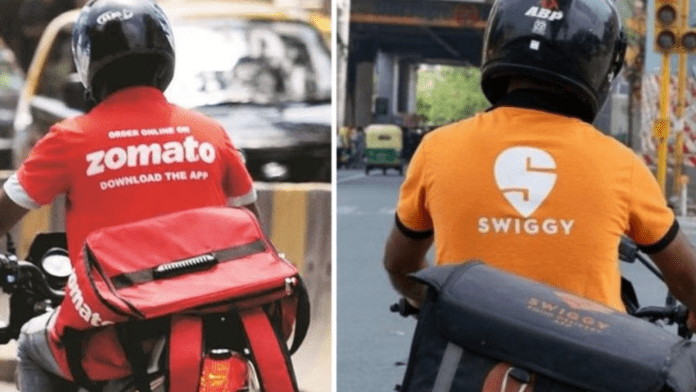Zomato and Swiggy intend to engage with goods and services tax authorities to clarify their stance following the issuance of notices demanding taxation on the delivery fees they have collected from consumers.
The situation may have broader repercussions, as indicated by a senior government official who suggested that other companies levying similar fees on users might also be required to pay taxes on the sum. These platforms assert that they transfer these amounts to their delivery partners.
The Directorate General of GST Intelligence has issued notifications to the two food delivery companies, requesting a total of INR 750 crore in GST. The breakdown includes INR 400 crore from Zomato and INR 350 crore from Swiggy, according to informed sources.
Also Read: Zomato stocks take a hit as tax notices over non-payment of GST rattle investors
These notices are preliminary, providing the companies with an opportunity to present their stance to the government before a conclusive demand notice is issued, as per the information provided by individuals familiar with the matter.
“Companies are engaging with lawyers and tax consultants to provide clarity to the authorities that the delivery fees are not accounted for as revenue but passed on to delivery workers,” a person briefed on the matter said.
However, the government official mentioned earlier emphasized that the delivery of food is considered a service subject to an 18% tax. Given that the platforms have been collecting a service fee, they are obligated to pay the corresponding tax.
“They have not paid GST on delivery fee charged from the consumers for the period between July 2017 and March 2023,” stated the official. GST was implemented in July 2017.
Swiggy did not reply to email inquiries, and Zomato declined to provide a comment.
From January 1, 2022, food-delivery platforms are mandated to collect and deposit GST on behalf of restaurants for sales made through them. Despite this requirement, there remains a lack of clarity regarding the treatment of the delivery fee component.
In the usual scenario with aggregators such as Zomato and Swiggy, gig workers function as delivery partners and receive compensation based on the orders they fulfill. Customers are generally charged a fee for the delivery service, with the exception of loyalty programs where platforms may provide free deliveries.
“Aggregators account for the delivery fees in their revenues … and then show the pay-outs (to delivery partners) as part of their expenses. This is perhaps where the confusion with GST authorities has arisen,” the person briefed on the matter said.
For the quarter ended on September 30, publicly listed Zomato reported INR 2,848 crore of operating revenue, with INR 919 crore designated for expenses related to delivery and associated charges.
“The genesis of the issue lies in the fact that while the aggregator platforms were made liable to pay tax as an ecommerce platform on the restaurant services supplied through them, the question of delivery services have been left open,” said Niraj Bagri, partner, Dhruva Advisors, a tax consultancy firm.
“A suitable clarification from the GST Council would address the situation and avoid the long-drawn litigation. Other aspects like terms of the contract with the consumer, method of accounting by the aggregator companies, establishing the nature of charges as reimbursable expenditure would also indicate the overall nature of the transaction and thereby determine the taxability,” Bagri added.
Experts and industry executives suggest that if the government maintains its position of imposing GST on delivery fees, it could potentially impact a broader spectrum of companies in the online delivery sector, encompassing quick-commerce platforms and online grocery delivery firms.
“The issue exposes a key pain point for the delivery industry, which is dependent on fleets of contractual or gig workers who are not employees. It is imperative for the companies to contest these claims…the ramifications of such a tax could be wide ranging on other platforms depending on delivery services including groceries, medicines, etc.,” a senior executive at a food delivery firm said.
The matter surfaced earlier this year when the Internet and Mobile Association of India (IAMAI), an industry association, presented a request to the GST Council seeking clarification on the issue.
“(Food delivery platforms) do not provide food delivery services on their own account but enable these services from delivery partners through their platform. Most, if not all, of these delivery partners are below the GST threshold limit of INR 20 lakh per annum (of earnings), and therefore not registered, or liable to do so under GST,” the IAMAI said in its submission in April this year.
The industry association also highlighted that the lack of clarity on GST for delivery services was resulting in “inconsistent and incongruous positions” being adopted by different jurisdictional authorities.
“This arbitrary assessment is not merely inconsistent with GST rules, but also unfeasible and unfair in seeking GST from ECOs (ecommerce operators) that has never been collected, knowing fully well that ECOs are not in a position to discharge any such amount retrospectively,” it added.





